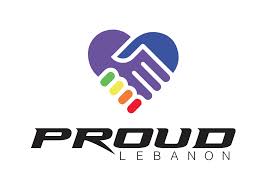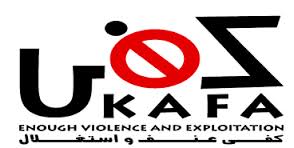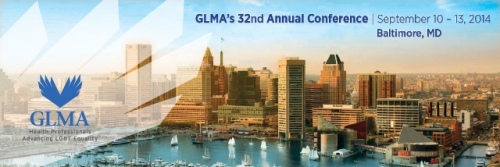Hashtag #LebMASH
This post was originally published on habdessamad.com on Oct. 26, 2014.
“Fifo is a Lebanese man who is being ostracized for expressing himself the way he wants.
People don’t like it so they pathologise it. He lives in New York and gets back at his haters with traditional Arabic proverbs. All wisdom in the proverbs is overseen and overlooked, his words and wit become meaningless as people can not get themselves to see him deeper than his appearance and mannerism.
“He is sick – mentally ill – sexual deviant” in the eyes of many on social media portals and until these misconceptions and fallacies get rectified many, like Firas, will not feel they can ever fit in, develop and prosper, will not even feel safe.
We can rectify it. That is why I believe in the work the Lebanese Medical Association for Sexual Health is doing. That is why I support LebMASH.
The Lebanese Medical Association for Sexual Health (LebMASH) has already started to make a difference on the ground in Lebanon.
 In 2014, LebMASH helped organize three medical conferences on LGBT health and provided educational sessions to Syrian refugees and womyn victims of sexual or physical abuse. LebMASH is in communication with the Lebanese Order of Physicians (LOP) to work on developing tools that will help bring an end to futile and harmful “Anal Tests” forced onto detainees to assess their sexual orientation. Shame Tests as the Lebanese media called them, were banned, on paper, by the LOP and the Ministry of Interior in 2012 but continue to be performed.
In 2014, LebMASH helped organize three medical conferences on LGBT health and provided educational sessions to Syrian refugees and womyn victims of sexual or physical abuse. LebMASH is in communication with the Lebanese Order of Physicians (LOP) to work on developing tools that will help bring an end to futile and harmful “Anal Tests” forced onto detainees to assess their sexual orientation. Shame Tests as the Lebanese media called them, were banned, on paper, by the LOP and the Ministry of Interior in 2012 but continue to be performed.
For the third year in-a-row, LebMASH sponsored a medical student to attend GLMA medical conference and continues to encourage students to read, research and write about LGBT and sexual health through the “Break The Silence” BTS competition grant. LebMASH already started sponsoring research on LGBT health in Lebanon, in the coming years, publications will start trickling into peer-reviewed medical journals and enriching a literature thirsty for such data.
LebMASH continues to network nationally and internationally to advance the healthcare of sexual minorities in Lebanon. LebMASH is in communication with Helem, Marsa, Arab Foundation for Equality, Kafa, the Legal Agenda among other civil society organizations to orchestrate the work needed to achieve its mission. Internationally, LebMASH has been an invited speaker in 2013 and 2014 to the annual medical conference of GLMA: Health Professionals Advancing LGBT Equality. In Sept. 2014, LebMASH ran a plenary session at GLMA’s conference in Baltimore discussing global LGBT health and showcasing Lebanon as a prototype of how health advocacy could be started. We also discussed LebMASH’s involvement in advocacy within the World Health Organization. On a different front, LebMASH was represented during the World Bank Spring meetings this year to work on gender, sexual orientation and gender identity safeguards. LebMASH continues to follow up and will again be present at the World Bank consultation in Beirut in Nov 2014.
All this work has been self-funded by the executive board and personal donations from supporters. This year, LebMASH is hosting its second annual fundraiser in New York. Fifo, which now became a #LebLGBT social media sensation, will be there and supporting. He already made a special #Hashtag #LebMASH video for the event:
To help LebMASH continue and build up on this great work, please keep LebMASH in mind when you are looking for a charity or an NGO to support. LebMASH also offers volunteerism, internship and partnership opportunities that you can read about on lebmash.org.”
LebMASH sessions at Proud
Since 2013, LebMASH has provided 3 educational sessions to beneficiaries of Proud Lebanon services.
In October 2013, LebMASH provided a session on general sexual health and specifically anal health to 40 people at Proud. The event proved popular, and lead to 2 other sessions.
In February 2014, LebMASH and Proud reconvened to host a session on psychology, mental health and depression. This session was facilitated by a psychiatrist, allowing for a greater insight into the topic. There were 55 participants to the session.
In June 2014, 2 LebMASH physicians offered a questions and answers session about sexual health. This event was also attended by 30 participants.
These events and their popularity show the need to continue offering such services in Beirut and the rest of Lebanon to raise needed awareness about sexual health.
| 48% of attendees said that they did not use condoms during their latest intercourse |
| 8% reported they faced descrimination in past year within health institutions |
- Does swallowing semen affect my immune system?
- Can we stop being homosexual or is it impossible?
- Can we catch HIV by kissing?
- I am horny all the time, I have sex with men and women, is there a way to stop having sex with men?
PS: this post was published originally by our intern and was edited later by members of our board on Sept 8, 2014
LebMASH and M-Coalition
On the 26th July 2014, the M-Coalition, hosted by the Arab Foundation for Freedom and Equality, was launched at the International AIDS Conference in Melbourne, Australia. The M-Coalition, featuring delegates from 5 Arab countries- Lebanon, Morocco, Algeria, Mauritania and Tunisia – seeks to better facilitate the access that men who have sex with me (MSM) have to HIV/AIDS prevention, care and treatment. Furthermore, another aspiration of the grouping is to encourage healthcare professionals to treat MSM clients in the same way as all their clientele. The M-Coalition is, furthermore, the only Arab HIV/AIDS organisation specifically dedicated to the needs of MSM, who are between 50 and 130% more likely to have HIV than the general population across the Arab World – according to M-Coalition’s own statistics.
The MENA (Middle East and North Africa) region, as compared to Sub-Saharan Africa, is generally considered to have low levels of HIV and AIDS across the populace, with the exceptions of Djibouti, Somalia and South Sudan. However, within the target group, who are also one of the most vulnerable social groups, subject to arrest and legalised torture, the rates are disproportionately high, explaining the need for such a group to come together to help create a better environment for MSM to seek treatment.
Johnny Tohmy, Executive Director of M-Coalition, said “at this key moment where the end of the HIV epidemic is potentially within reach, we have committed to increase our efforts envisioning an Arab world where right to health and all other human rights of MSM are recognized, realized and protected.” (Full article found here)
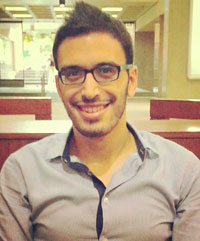
Dr. Omar Harfouche, chosen to sit on the board of M-Coalition. Dr. Harfouche, LebMASH’s Vice-President is a long-time activist for many human rights causes.
LebMASH is proud to work with the M-Coalition and would like to congratulate Dr. Omar Harfouche, one of the founders of LebMASH, on his concurrent position on the M-Coalition board. Dr. Harfouche was selected by the members of the M-Coalition to work with them. We believe that the participation of the M-Coalition at the International AIDS Conference is a great step forward, representing the unheard voice of the MENA region within the discussion of LGBT rights and HIV/AIDS rights, both subjects traditionally considered taboo within the Arab World.
Dr. Harfouche explains that “the importance of the M-coalition lies with the exchange of all the experience and expertise of different organizations and different approaches from different countries in the Arab world. While meeting in Tunisia with the rest of the board members, we are able to look at the ways of addressing discrimination against PL-HIV (people living with HIV) and MSM in different countries and try to think of different ways to tackle these issues based on each person’s own experience.
“M-coalition’s strength also lies in being a new reference point for MSM living with HIV in the region and on prevention strategies for this key population. This population has been neglected by many prevention campaigns and this subject wasn’t tackled the way it should have been, knowing that MSM are still one of the most populations at risk in the MENA region.
“Finally, here’s what I think LebMASH can offer to the M-coalition: I will be representing Lebanon in the M-coalition and not only LebMASH but I feel that the medical background that LebMASH has is of great importance to guide other initiatives that would work with health care professionals in the MENA region.”
LebMASH and Kafa on Domestic Violence
On the 28th of February 2014 LebMASH organised a session on sexual health with a support group of female victims of domestic violence at KAFA.
The session was held by Dr. Sally Khoury, a gynecology senior resident at AUB-MC, and it consisted of a Q&A on different topics on sexual health. The interest of the women from the support group in this topic and their need to know more about their own sexual health proves that something is lacking in awareness on women’s sexual health.
Even though many initiatives to educate women more on sexual health were taken, women still lack basic information on their own sexual health. They also fear visiting the gynecologist and discussing anything related to sexual health. This is undeniably due to the taboo and the social stigma that is associated with sexual health and with women’s sexual health in particular. In Lebanon and in other Arab countries, the discussion of women’s sexual activity, pleasure or even sexual health is not considered morally appropriate.
One of LebMASH’s main activities is to spread awareness among groups that face discrimination, for instance sexually active women and victims of rape. Furthermore, we know that an important step is to make gynecologists, physicians or even health care professionals in general more aware on how to help their patients feel more comfortable whilst talking about their sexuality and when addressing their sexual health.
Finally, we would like to thank Dr. Khoury for her efforts and KAFA for the opportunity to collaborate and we enthusiastically hope to work together on many more projects in the future.
LebMASH’s Vice President – Omar Harfouch
27 Men Arrested in Agha Hammam, Beirut
On the ninth of August, Lebanese police, from the Hbeish police station, which has formerly been criticised for using the anal probe test to investigate human sexuality, arrested 27 men in a Beiruti bathhouse, Agha Hammam, in the Hamra-Concord district of Beirut. The police have reported that all men were unarmed and that the police had arrested the men based on tip-off information from a previously arrested gentleman, who claimed that Agha Hammam was a meeting place for men seeking to have sex with other men. The raid, according to Helem, the Arab World’s first LGBT rights organisation, is the largest since the Borj Hammoud cinema raid in 2013.
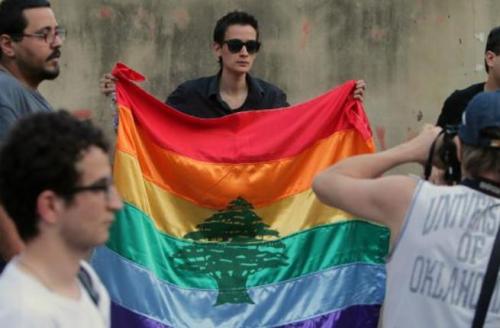
27 men have been arrested for public indecency in a Beirut bathhouse – rights groups, such as LebMASH have been calling for their release.
Whilst the anal test has been used by this particular police station before, despite the fact it runs against the Lebanese Order of Physicians’ (LOP) Code of Conduct, the police have announced that, thankfully, it was not inflicted upon these unfortunate men. However, Colonel Tony Haddad of the police has claimed that the sexual orientation of 24 of the men has been ‘confirmed’, whereas 3 of the men have been described ‘not gay’.
Despite the branding of the majority of these man as ‘Luwat’ by such media outlets as MTV Lebanon (translating to ‘fags’, in English), there is no proof that any sexual intercourse or activity was taking place at the time of the arrest. The owner, employees and all the clientele present at the time were arrested. The clientele remain in custody.
A coalition of 5 advocacy groups – Helem, The Arab Foundation for Freedom and Equality (AFE), The Lebanese Medical Association for Sexual Health (LebMASH), M-Coalition and Marsa Sexual Health Clinic – have come together and released a strong position statement, saying: “we denounce this incident as a case of homophobic practice that aims to police the sexual rights and liberties of the individuals involved… We call on the General Prosecutor and Hbeish police station to respect the dignity of the detainees and their rights to their (sexual) bodies.”
Legal Agenda, a human rights organisation in Beirut, have announced that the men have been held longer than is legally allowed by the Lebanese Penal Code, for, under Article 47, they may only be held for 48 hours, which is renewable once. However, under Article 105, crimes which are punishable by only one year in jail do not apply. The men are understood, however, not to be being charged with the standard Article 531, which condemns homosexual intercourse as ‘unnatural’, but, rather to be being charged with Article 521, which condemns public indecency.
Sarah Wansa, of Legal Agenda, told Al-Akhbar (a Lebanese daily newspaper), that they [Legal Agenda] no longer consider homosexuality to be a crime punishable under Article 534 because of its designation of homosexuality as ‘unnatural’ – a claim which LebMASH has been stridently fighting against through its seminars around Lebanon.
There have been two precedents where homosexuality has not been punished by Lebanese judges. However, because Lebanese law was based on the French Civil Law system, rather than the English Common Law system, these precedents do not change future rulings, meaning that homosexuals will still be at risk of prosecution under Article 534 is no longer applied to homosexuality.
Anal Tests in Lebanon
Anal tests for homosexuality are not useful in assessing someone’s sexual orientation or behavior and can be harmful physically and psychologically
The Lebanese Medical Association for Sexual Health (LebMASH) has recently learned that a Forensic physician in Lebanon, Dr. A. M. has conducted anal tests on several individuals to determine their sexual orientation.
LebMASH is extremely concerned to hear that this practice, “the anal test”, continues to take place in Lebanon especially given that:
– This test is antiquated and does not yield any useful information about a person’s sexual orientation or behavior.
– This test can be harmful physically and psychologically to the person receiving it.
– The order of physicians in Lebanon banned this test in an official Memo in 2012.
– The test is unethical, violating a major component of the Hippocratic Oath: non-maleficence or “first, do no harm”.
Before we discuss the anal test itself, it’s important to understand that male homosexuality has three different aspects to it:
- Sexual orientation: the sexual and/or emotional attraction to another person of the same sex and the desire to be with this other person.
- Sexual behavior: the actual sexual acts that involve two men and can include kissing, body contact, oral sex, mutual masturbation, anal stimulation, and anal intercourse.
- Sexual identity: identifying socially as being homosexual or gay.
A person can have a homosexual sexual orientation but not engage in sexual behavior with other men and without identifying as gay. Another person can have a homosexual sexual orientation and engage in sexual behavior with other men but not identify socially as gay. And finally, a person can have homosexual sexual orientation, engage in sexual behavior with other men, and identify socially as being gay.
The so-called anal test for homosexuality involves the insertion of a metal object into a man’s anal canal through the anus allegedly to find out if this person is homosexual. Homosexuality, just like heterosexuality, is a very complex construct and can’t possibly be determined by a simple test.
The only “medical” reference to the use of the anal test in relation to homosexuality is a paper published by a French medico-legal expert named Auguste Ambroise Tardieu back in 1857. Tardieu claimed that “chronic sodomites” have certain specific penile and anal physical characteristics that are unique to them.
Today, over 150 years later, we know that what is mentioned in Tardieu’s study is not true. Adult men who engage in consensual anal intercourse do not have any permanent penile or anal characteristics that are unique to them. Therefore performing an anal test on them is futile.
The anus is the external opening of the anal canal, which is the terminal part of the human colon. The anus has 2 sphincters: the internal anal sphincter that is an involuntary muscle and the external anal sphincter that is a voluntary muscle (i.e. can be opened and closed at will by the person).
If we examine the report of Dr. A. M. more closely, we can see in more details how misguided he is about both normal anal anatomy and homosexuality. In his report, Dr. A. M. mentions that there was “no evidence of accumulation, tear or redness”. Normal homosexual anal intercourse between two consenting adults does not lead to “accumulations, tears or redness”. Even if there was evidence of any of these findings on an anal exam, these findings can be attributed to a number of medical conditions such as an anal abscess, an anal fissure, constipation or hemorrhoids all of which can cause changes in the anal mucosa.
Dr. A. M. also mentions in his report that “the anal sphincter is functioning normally”. Adult men who engage in consensual anal intercourse, even if it is on a regular basis, do not have abnormalities in the functioning of their anal sphincters. The anal sphincters have the natural ability to expand when needed (for example to receive anal intercourse) and return to their normal size and tone afterwards. This is seen every day when passing a bowel movement. The internal anal sphincter relaxes naturally and the external sphincter is voluntarily relaxed to allow for defecation. However, following this, both sphincters return to their normal tone and functioning.
Performing an anal test on someone to find out information about someone’s sexual orientation or behavior is not only futile, but can also be very harmful physically and psychologically.
Physically, inserting a metal object into an anal canal in an uncontrolled location such as a police station can place the person at risk for infections such as Human Papilloma Virus (HPV) and Hepatitis, to mention a few. Inserting an object as small as a finger into one’s anal canal by a Forensic doctor can cause excruciating pain and/or tears, even for someone who regularly engages in anal intercourse. The difference is that when engaging in normal anal intercourse, the individual has the chance to gradually and voluntarily relax the anal sphincters, as well as many muscles that exist in the perineal area, in order to receive anal intercourse, that is perceived as pleasurable by this individual. On the other hand, and similar to being raped, inserting an object as small as a finger into someone’s anal canal without their consent and without giving them the chance to gradually relax their muscles will lead to the opposite scenario, i.e. to further contracture of the anal sphincters and perineal muscles, and therefore will lead to severe pain and possible injury.
Psychologically, subjecting someone to this anal test discussed here can lead to severe psychological trauma similar to the trauma that individuals can endure after being raped. In addition to the shame and humiliation, the individual subjected to this cruel procedure is at risk of developing Post Traumatic Stress Disorder (PTSD) and possibly sexual dysfunction by being unable to receive normal consensual anal intercourse or even anal stimulation in the future.
LebMASH calls on the Lebanese Order of Physicians (LOP) to take responsibility for the actions of one of its members by enforcing disciplinary measures on Dr. A.M. to reinforce LOP’s ban on these tests issued on Aug. 7, 2012.
LebMASH reiterates its position regarding homosexuality being a normal variation of human sexuality and therefore not a medical or psychiatric condition that requires diagnosis or treatment.
LebMASH is happy to provide LOP members and especially to Dr. A.M. cultural competency training and consulting for issues related to sexual orientation and gender identity.
LebMASH urges the LOP to issue an official statement, similar to those issued in July of 2013 by the Lebanese Psychiatric Society and Lebanese Psychological Association, asserting that homosexuality is not a disease and that homosexuality is a normal variant of human sexuality.
We also call on the law enforcement agencies in Lebanon to abide by Lebanon’s commitment to the Universal Declaration of Human Rights, especially Article 5 the part relating to humane treatment of people in custody. We call on those agencies to respect people’s right to the integrity of their bodies. LebMASH calls on lawyers and judges to stop using Article 534 of the Lebanese penal code to criminalize homosexuals since the sexual act between two consenting adults of the same gender is not “against nature.”
الفحوصات الشرجية في لبنان
الفحوصات الشرجية للمثلية الجنسية ليست مفيدة في تقييم الميول أو السلوك الجنسية لشخص ما، ويمكن أن تكون ضارة جسديا ونفسيا.
لقد علمت الجمعية الطبية اللبنانية للصحة الجنسية (LebMASH) مؤخرا أن الطبيب الشرعي في لبنان الدكتور أ.م. قد أجرى فحوصات شرجية على عدة أشخاص لتحديد ميولهم الجنسية.
الجمعية الطبية اللبنانية للصحة الجنسية قلقة للغاية لسماع أن هذه الممارسة، “ألفحوصات الشرجية”، لا تزال تحصل في لبنان خاصة وأن :
– هذا الفحص قديم جداً ولا يسفر عن أية معلومات مفيدة حول التوجه أو ألسلوك الجنسي للشخص.
– هذا الفحص يمكن أن يكون ضارا جسديا ونفسيا للشخص الذي يتعرض له.
– نقابة الأطباء في بيروت حظرت هذا الفحص في مذكرة رسمية في العام 2012.
– هذا الفحص غير أخلاقي وينتهك عنصرا رئيسيا من قسم أبقراط الطبي: غير الإيذاء أو “أولا، عدم إلحاق أي ضرر”.
قبل أن نناقش الفحص الشرجي نفسه، من المهم أن نفهم أن المثلية الجنسية عند الذكور لديها ثلاثة جوانب مختلفة:
١-الميل الجنسي: الانجذاب الجنسي و / أو العاطفي لشخص آخر من نفس الجنس والرغبة للشخص أن يكون مع هذا الشخص الآخر.
٢- السلوك الجنسي: الأفعال الجنسية الفعلية التي تتضمن رجلين ويمكن أن تشمل التقبيل، الاتصال الجسدي، الجنس الشفوي، الاستمناء المشترك، إثارة الشرج، او الجنس الشرجي.
٣- الهوية الجنسية: التعرف اجتماعيا للشخص بكونه مثلي الجنس.
يمكن للشخص أن يكون توجهه الجنسي مثلي الجنس من دون ان يشارك في السلوك الجنسي مع رجال آخرين ومن دون تحديد هويته كمثلي الجنس. يمكن لشخص آخر ان يكون ميله الجنسي مثلي الجنس ويشارك في السلوك الجنسي مع رجال آخرين من دون تحديد هويته كمثلي الجنس. وأخيرا، يمكن للشخص أن يكون توجهه الجنسي مثلي الجنس ويشارك في السلوك الجنسي مع رجال آخرين ويحدد هويته كمثلي الجنس.
ما يسمى فحص الشرج يتضمن ادخال أداة معدنية في قناة الشرج عند الرجل من خلال فتحة الشرج لمعرفة ما إذا كان هذا الشخص هو مثلي الجنس. المثلية الجنسية، تماما مثل المغايرة الجنسية، هي مفهوم معقد للغاية، ولا يمكن أن يحددها فحص بسيط.
الاشارة “الطبية” الوحيدة لاستخدام فحص الشرج فيما يتعلق بالمثلية الجنسية هي دراسة نشرت من قبل خبير الطب الشرعي الفرنسي أوغست أمبرواز تارديو في العام 1857. ادعى تارديو أن ألاشخاص الذين يمارسون الجنس الشرجي بشكل منتظم لديهم خصائص جسدية معينة في القضيب والشرج.
اليوم، بعد أكثر من 150 عاما، نعلم أن ما ورد في دراسة تارديو ليس صحيحا. الرجال الذين يشاركون في المعاشرة الشرجية بالتراضي ليس لديهم أي خصائص جسدية معينة في القضيب أو الشرج.
الشرج هو الفتحة الخارجية للقناة الشرجية، وهو الجزء الخارجي للامعاء الغليظة عند الإنسان. الشرج لديه عضلتين عاصرتين: العضلة العاصرة الشرجية الداخلية التي هي العضلة غير الطوعية والعضلة العاصرة الشرجية الخارجية التي هي العضلة الطوعية (أي يمكن فتحها وإغلاقها عند الرغبة من قبل الشخص).
إذا نظرنا إلى تقرير الدكتور أ.م. عن كثب، يمكننا أن نرى في مزيد من التفاصيل مدى ضلله في مجال المثلية الجنسية وفي التركيبة البنيوية للشرج. يذكر الدكتور أ.م. في تقريره أنه لم يكن هناك “أي آثار لتكوم أو تمزق أو احمرار في أو حول منطقة الشرج”. في الحقيقة، لا تؤدي المعاشرة الشرجية العادية عند مثليي الجنس إلى “تكوم، تمزق أو احمرار”. حتى لو كان هناك أي دليل على هذه النتائج في فحص الشرج، يمكن أن تعزى هذه النتائج إلى عدد من الحالات الطبية مثل الخراج الصديدي، الشرخ الشرجي، والإمساك أو البواسير وكلها يمكن أن تسبب تغيرات في غشاء الشرج.
يذكر الدكتور أ.م. أيضا في تقريره أن “العصارة الشرجية تعمل بشكل طبيعي”. في الحقيقة، الرجال الذين يشاركون في المعاشرة الشرجية بالتراضي، حتى لو كان بشكل منتظم، ليس لديهم عطل في عمل العضلات العاصرة للشرج. هذه العضلات لديها القدرة الطبيعية للتوسع عند الحاجة (على سبيل المثال عند حصول المعاشرة الشرجية) والعودة إلى حجمها الطبيعي بعد ذلك. يحصل ذلك يوميا عند الخروج. العضلة العاصرة الشرجية الداخلية تسترخي بشكل طبيعي والعضلة العاصرة الخارجية تسترخي طوعا للسماح بالخروج. ولكن، بعد ذلك، تعود العضلات العاصرة إلى وضعها وأدائها الطبيعي.
إجراء الفحص الشرجي على شخص ما لمعرفة توجهه أو سلوكه الجنسي ليس فقط غير مجدي، ولكن يمكن أيضا يكون ضارا جدا جسديا ونفسيا.
جسديا، إدخال جسم معدني في قناة الشرج في مكان غير منضبط مثل مركز للشرطة تضع الشخص في خطر للعدوى مثل فيروس الورم الحليمي البشري (HPV)، والالتهاب الكبدي، على سبيل المثال لا الحصر.
إدخال شيء حتى بصغر الاصبع في قناة الشرج من قبل طبيب شرعي يمكن أن تسبب ألام مبرحة و/أو أمزاق، حتى بالنسبة لشخص يمارس الجنس الشرجي بانتظام. الفرق هو أنه عند ممارسة الجنس الشرجي العادي، لدى الفرد فرصة لاسترخاء العضلات العاصرة تدريجيا وطوعيا، وكذلك العديد من العضلات التي توجد في منطقة العِجان، لكي تحصل المعاشرة الشرجية، التي تعتبر ممتعة بهذه الطريقة من قبل هذا الشخص. من ناحية أخرى، وعلى غرار التعرض للاغتصاب، إدخال شيء حتى بصغر الاصبع في القناة الشرجية لذلك الشخص دون موافقتهم ودون منحهم فرصة لاسترخاء عضلاتهم تدريجيا يؤدي إلى السيناريو المعاكس، أي إلى مزيد من انكماش في العضلات العاصرة وعضلات العِجان، وبالتالي يؤدي إلى ألم شديد وضرر.
نفسيا، إخضاع شخص ما لهذا افحص يمكن أن يؤدي إلى صدمة نفسية حادة مشابهة للصدمة التي يتحملها الأفراد الذين يتعرضون للاغتصاب. بالإضافة إلى العار والذل، الفرد الذي يخضع لهذا الإجراء القاسي في خطر أن يصاب اضطراب ما بعد الصدمة (PTSD) وربما العجز الجنسي عن طريق عدم القدرة على تلقي الجنس الشرجي العادي بالتراضي أو حتى إثارة الشرج في المستقبل.
تدعو الجمعية الطبية اللبنانية للصحة الجنسية نقابة الأطباء في لبنان لتحمل المسؤولية عن تصرفات أحد أعضائها من خلال فرض تدابير تأديبية على الدكتور أ.م. لتعزيز الحظر على هذه الفحوصات الصادر بتاريخ 7 أغسطس 2012 من قبل نقابة الأطباء.
الجمعية الطبية اللبنانية للصحة الجنسية تكرر موقفها من المثلية الجنسية كونها اختلاف طبيعي في الميل والنشاط الجنسي، وبالتالي ليست حالة طبية أو نفسية تتطلب التشخيص أو العلاج.
الجمعية الطبية اللبنانية للصحة الجنسية مستعدة لتقديم التدريب والاستشارات لأعضاء نقابة الأطباء في لبنان، وخاصة للدكتور أ.م.، في القضايا المتعلقة بالميول والهوية الجنسية.
الجمعية الطبية اللبنانية للصحة الجنسية تحث نقابة الأطباء في لبنان لإصدار بيان رسمي، مماثلاً للذي صدر في شهر يوليو من عام 2013 من قبل جمعية الطب النفسي اللبناني وجمعية علم النفس اللبنانية، مؤكدة أن المثلية الجنسية ليس مرضا وأن المثلية الجنسية هي اختلاف طبيعي في النشاط الجنسي.
كما ندعو الاجهزة ألامنية في لبنان على التقيد بالتزام لبنان بالإعلان العالمي لحقوق الإنسان وخاصة المادة (5) والجزء المتعلق بالمعاملة الإنسانية للأشخاص في الحجز. ندعو تلك الاجهزة إلى احترام حق الناس في نزاهة أجسادهم.
الجمعية الطبية اللبنانية للصحة الجنسية تدعو المحامين والقضاة على التوقف عن استخدام المادة 534 من قانون العقوبات اللبناني لتجريم المثليين جنسيا نظراً بأن الفعل الجنسي بالتراضي بين شخصين بالغين من نفس الجنس ليس “ضد الطبيعة”.
نشكر الاستاذ باتريك ريميلي على الترجمة إلى اللغة العربية.
Break the Silence 2014: The Winner
The Lebanese Medical Association for Sexual Health (LebMASH) is proud to announce the winner of the 2014 “Break the Silence” competition as Rami Shukr.
To enter the competition, students in the medical field were asked to submit an essay about a specific issue related to either women’s sexual health or LGBT (lesbian, gay, bisexual, transgender) health in Lebanon.
Submissions are reviewed and graded by LebMASH’s Executive Board. The winner receives funding to attend a medical conference anywhere in the World. This year’s choice was the Gay and Lesbian Medical Association (GLMA) 32nd annual conference to be held in Baltimore, Maryland from the 10th to the 13th September 2014. This year’s conference theme is ‘Innovation & Collaboration for LGBT Health Equality’.
Rami, who will graduate this year from the Lebanese American University with a BA in Pscyhology, entered the competition in order to “contribute to the growing movement of LGBT research in Lebanon”. He wants to shift the discourse on LGBT health and other issues away from the traditional and moral dogma towards a scientific and research based focus.
His prize-winning paper focused on stress, identity, and community among a sample of gay men in Beirut. Although there are Lebanese studies on MSM (men who have sex with men), there is no study, which uses culturally-relevant research, on the dynamics of MSM/gay (self-)identification. He also sought to investigate the feelings gay men have about the current state of advocacy in Lebanon and what they believe is lacking or could be improved. In his own words, he believes that “Investigating these factors would help elicit better advocacy and would help us point-out where change is most needed. Although my research was quite preliminary in nature, focusing exclusively on gay men, it could provide a starting point for more empirical research into the dynamics of LGBT stress, identity, and community in Lebanon.”
LebMASH formally congratulates Rami on winning the competition. We would also like to thank all the entrants whose essays we received. Finally, we take this opportunity to encourage as many students as possible to apply for next year’s competition.
LebMASH at Notre Dame University
LebMASH was invited to participate in a student project on sexual health in Lebanon. The project consisted of having an interview on a talk show organized by Amine Rhayem, 3rd year journalism student at the Notre Dame University. Rhayem chose to have LebMASH and Marsa (sexual health clinic) on his panel to discuss sexual health in Lebanon.
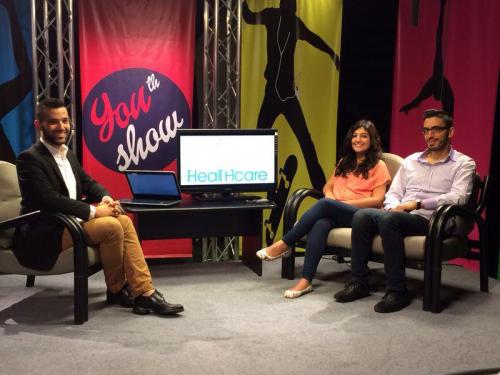
Dr. Omar Harfouch, Vice President of LebMASH, discussing with Amine Rhayem (NDU) and Yara Al Mousawi (Marsa)
LebMASH, represented by its vice president Omar Harfouch, talked about the difficulties that face individuals who seek sexual health services in clinics especially LGBT individuals and sexually active women. Harfouch also talked about LebMASH’s achievements so far on lobbying for the release of the Lebanese Psychiatric Society and Lebanese Psychological Association’s statements on homosexuality not being a disease and condemning so called reparative therapies. Harfouch also mentioned the recent educational sessions and workshops done with health care professionals on how to deal with LGBT health and sexual health. Marsa, represented by its communication officer Yara Al Mousawi, talked about the services that are offered to Marsa and about the discrimination that still surrounds sexual health in Lebanon.
The talk show was attended by professor and journalist May Chidiac who congratulated the guests on their work in the sexual health field.
We at LebMASH wish Amine Rahyem all the best on this project and thank him for thinking of us as an outlet to spread awareness on sexual health.
LebMASH at USJ: Homosexuality Seen by the Professionals
On the 29th May 2014, LebMASH was hosted by Université Saint-Joseph in Beirut to give a talk on the perceptions of homosexuality within the medical profession and wider society. Chaired by Dr. Sami Richa, head of psychiatry at the university, and Father Michel Scheuer, head of the university’s ethics department, the talk was the first time that the subject of sexuality and gender identity had been broached within the Jesuit-run university. In his introductory address, Dr. Richa explained that the goal was to understand the problems of the LGBT (Lesbian, Gay, Bisexual and Transgender) community, being a medical subject of great importance. The talk was attended by over 100 people, including many medical students from the university and members of the public.
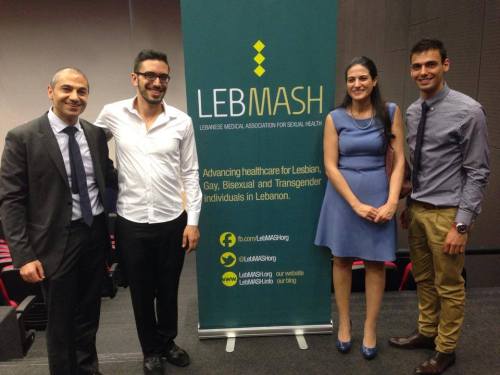
The Board Members of LebMASH present at the talk (from left): Dr. Omar Fattal, Dr. Omar Harfouche and Dr. Hasan Abdessamad. Alongside the Board, Dr. Hala Kerbage, a Member of LebMASH, gave a talk on the history of social perceptions to homosexuality.
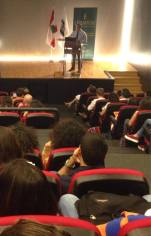
Dr. Fattal speaking about the clinical approaches physicians and healthcare providers should take, when dealing with LGBT patients.
There were three speakers, two of whom came from LebMASH. Dr. Fattal, a board member, discussed the approaches that the students might take towards their LGBT patients, focusing on the state of medical care in Lebanon for the LGBT community today and how it might change in the future. He particularly emphasised a gender and orientation inclusive way of speaking, so that it appears to the patient that the doctor has thought through every possibility. He also addressed the lack of understanding around the gay community, hoping to shed some light on the myths and realities of the LGBT community.
Dr. Hala Kerbage, also of LebMASH and a psychiatrist at Hôtel-Dieu de France, followed his talk, by discussing the historical perceptions of homosexuality around the world. She focused her attention on studies such as the Hooker Report of 1957 which was the first report to research non-patients, meaning that for the first time, people without current medical or mental illnesses were part of a research experiment. Hooker found no more signs of psychological disturbances in a group of non-patient homosexuals compared to non-patient heterosexual controls. Dr. Kerbage also referenced the Kinsey Report, which found that 37% of people have experienced at least one homosexual act in their life. The Beach and Ford study was also mentioned and this study found homosexuality to be common across cultures and to exist in almost all nonhuman species. Their work supported the idea that homosexuality was natural and more widespread than previously thought.
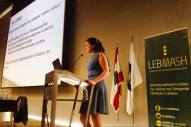
Dr. Hala Kerbage discussing the historical perceptions of homosexuality in the West and the East, focusing her attention on Lebanon.
She then turned her attention towards Lebanon and Article 534, which unfairly criminalises homosexuals forbeing ‘unnatural’. However, consistently throughout the talk, she had proved that homosexuality was not a mental disorder or a deviance from the norm, indeed it being normal. Recently, LebMASH, the Lebanese Psychiatric Society and Lebanese Psychological Association, have all come out against the classification of homosexuality as unnatural and stood against conversion therapy, stating that it is not effective and it is harmful for the individual.
The final talk of the conference was presented by Ms. Mima Mzawak, a sociologist, who spoke about homosexuality beyond the social perception. Science is the best method, according to Ms. Mzawak, to discover the truth about Man, halting the continued use of institutionalised terms for the LGBT community and stereotypes surrounding what it means to be a man, or a woman. She focused on different approaches towards combatting homophobia.
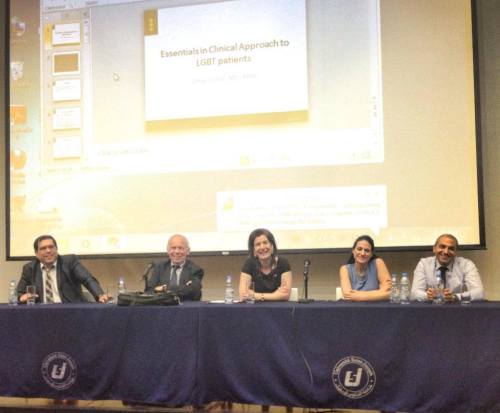
The panel at this talk on Homosexuality as seen by the Professionals (from left: Dr. Sami Richa, Father Michel Scheuer, Ms. Mima Mzawek, Dr. Hala Kerbage and Dr. Omar Fattal
LebMASH would like to thank Dr. Richa and Father Scheuer and the Université Saint-Joseph for hosting the talk. We would also like to thank the over 100 attendees for their attentiveness and considered questioning.

